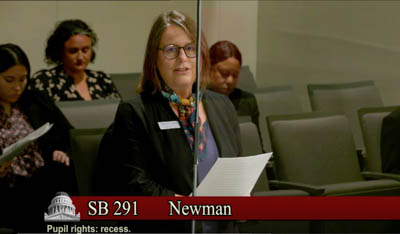Campus News
Rebecca London testifies in support of bill that would guarantee recess for California students
Associate Professor of Sociology Rebecca London testified before the California State Senate Education Committee on April 12 in support of SB 291, which would guarantee at least 30 minutes of recess per day for California students in kindergarten through eighth grade.

Screenshot

Associate Professor of Sociology Rebecca London testified before the California State Senate Education Committee on April 12 to explain how daily recess benefits students’ social and emotional development and improves classroom performance. London has been studying the importance of recess for more than 15 years and is the author of the book Rethinking Recess: Creating Safe and Inclusive Playtime for All Children in School. Among her findings is that recess is often withheld from students as a form of punishment.
“My research indicates that this is a really common practice, especially in elementary schools, but it’s not an evidence-based practice,” London told legislators during her testimony. “There is no research showing that withholding recess improves student behavior. In fact, both the CDC and the American Academy of Pediatrics endorse banning the practice of withholding recess, because it is not aligned with the goals of positive child and youth development.”
London explained that withholding recess is often counterproductive, because unstructured playtime actually “helps children to concentrate in the classroom, it supports their executive functioning, allowing them to make good decisions, improves their classroom behavior, and together all of that helps to improve academic performance.” She also shared that the connection students enjoy with peers and adults during recess even has the potential to provide “a buffering effect for students who have had adverse childhood experiences.”
London had been called before the committee to provide expert testimony in support of SB 291, which would guarantee at least 30 minutes of recess per day for California students in kindergarten through eighth grade. Schools would have flexibility to distribute that time throughout the day, and the bill contains an exception for situations when a student’s participation in recess would pose an immediate safety threat.
State Sen. Josh Newman, D-Fullerton, who authored the bill, told the committee that, in the wake of pandemic-era educational disruptions and increasing student mental health challenges, he believes “the benefits of unstructured play and peer-to-peer social interactions that are offered by recess are more important now than ever.”
Newman said that, unlike some other states, California doesn’t currently set a standard for the quality or quantity of recess that schools should be providing each day. Instead, existing state law specifically authorizes teachers to withhold recess for disciplinary reasons.
“As parents, it seems self-evident that recess is a good and necessary thing, so it is sometimes surprising to find out that it’s not provided,” Newman told the committee. “And the impacts are real. That’s the genesis of this bill.”
SB 291 ultimately received enough votes to pass the education committee and will now be re-referred to the committee on appropriations. Prior to the vote, State Sen. Scott Wilk, R-Santa Clarita, expressed his enthusiastic support for the bill and shared his hopes for the impact it could have.
“Three years ago, this body passed the ‘late start-time’ bill, and I think this bill can be as significant as that bill in terms of the quality of our students’ lives,” Wilk said.